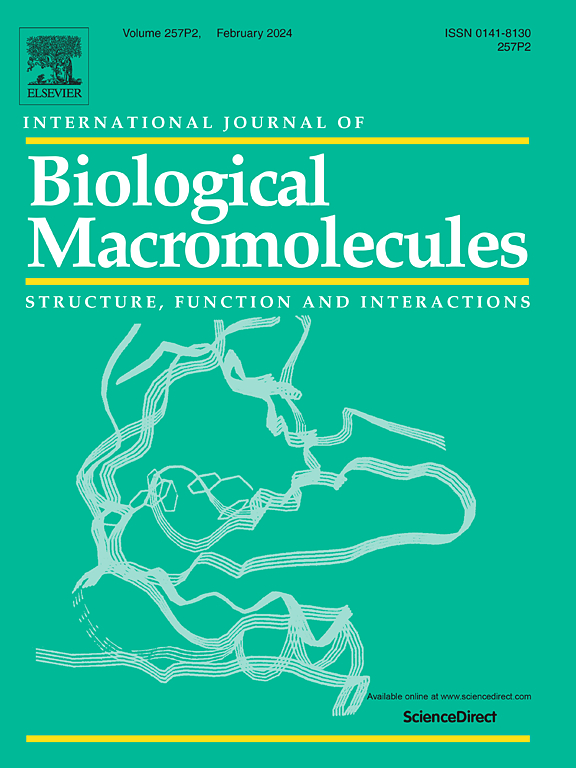Biodegradable composites of modified holocellulose, poly(butylene adipate-co-terephthalate), and polylactic acid: Preparation and properties
IF 8.5
1区 化学
Q1 BIOCHEMISTRY & MOLECULAR BIOLOGY
International Journal of Biological Macromolecules
Pub Date : 2024-11-16
DOI:10.1016/j.ijbiomac.2024.137763
引用次数: 0
Abstract
Holocellulose was extracted from corn cobs by a deep eutectic solvent and modified by various carboxylic acids. The resulting holocellulose esters were further blended with poly(butylene adipate-co-terephthalate) (PBAT) and polylactic acid (PLA) by using a solvent casting method to prepare holocellulose ester/PBAT/PLA composites. The mechanical properties of the composites were affected by the length of the ester side chain of the modified holocellulose. The addition of lauric acid-modified holocellulose, i.e., holocellulose laurate (HCL), effectively improved the compatibility between the components in the composite, and the composite with 4 wt% HCL showed good comprehensive properties. Compared with PBAT/PLA, HCL/PBAT/PLA composite had better mechanical properties, water stability and gas barrier stability, and similar thermal stability. The elongation at break increased by 41.0 %, while the water absorption capacity, water vapor permeability and oxygen permeability decreased significantly. The HCL/PBAT/PLA composite also demonstrated good reprocessability and simulated transport properties. There were no significant changes in the mechanical properties and structure after five cycles of reprocessing and simulated transport, and the mechanical property retention rates were 93.7 % and 95.2 %, respectively. The results showed that modified holocellulose can be used as a toughening agent and filler, which can expand the application of lignocellulose in the field of biodegradable packaging materials.
改性全纤维素、聚己二酸丁二醇酯和聚乳酸的可生物降解复合材料:制备与性能。
采用深共晶溶剂从玉米芯中提取全纤维素,并用各种羧酸对其进行改性。通过溶剂浇注法将得到的全纤维素酯与聚己二酸丁二醇酯(PBAT)和聚乳酸(PLA)进一步混合,制备出全纤维素酯/PBAT/PLA 复合材料。复合材料的机械性能受改性全纤维素酯侧链长度的影响。加入月桂酸改性全纤维素(即月桂酸全纤维素(HCL))可有效改善复合材料中各组分之间的相容性,含 4 wt% HCL 的复合材料具有良好的综合性能。与 PBAT/PLA 相比,HCL/PBAT/PLA 复合材料具有更好的机械性能、水稳定性和气体阻隔稳定性,且热稳定性相似。断裂伸长率提高了 41.0%,而吸水能力、水蒸气透过率和氧气透过率则明显下降。HCL/PBAT/PLA 复合材料还表现出良好的再加工性和模拟传输特性。经过五个循环的再加工和模拟运输后,其机械性能和结构没有发生明显变化,机械性能保持率分别为 93.7% 和 95.2%。结果表明,改性全纤维素可用作增韧剂和填充剂,从而拓展了木质纤维素在可生物降解包装材料领域的应用。
本文章由计算机程序翻译,如有差异,请以英文原文为准。
求助全文
约1分钟内获得全文
求助全文
来源期刊
CiteScore
13.70
自引率
9.80%
发文量
2728
审稿时长
64 days
期刊介绍:
The International Journal of Biological Macromolecules is a well-established international journal dedicated to research on the chemical and biological aspects of natural macromolecules. Focusing on proteins, macromolecular carbohydrates, glycoproteins, proteoglycans, lignins, biological poly-acids, and nucleic acids, the journal presents the latest findings in molecular structure, properties, biological activities, interactions, modifications, and functional properties. Papers must offer new and novel insights, encompassing related model systems, structural conformational studies, theoretical developments, and analytical techniques. Each paper is required to primarily focus on at least one named biological macromolecule, reflected in the title, abstract, and text.

 求助内容:
求助内容: 应助结果提醒方式:
应助结果提醒方式:


